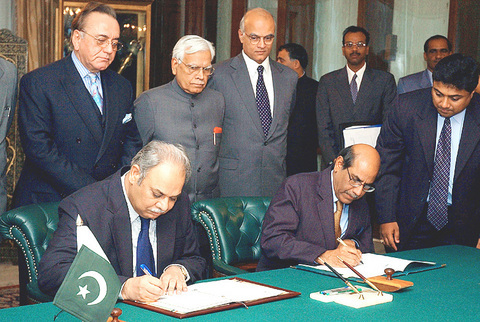India and Pakistan signed two agreements on security cooperation yesterday as their foreign ministers discussed a tentative peace process, but a breakthrough on their core dispute over Kashmir was not expected.
India's Natwar Singh and his Pakistani counterpart, Khursheed Mehmood Kasuri, said their talks were going well as officials signed pacts on advance warning of ballistic missile tests and on a hotline between their coast guards.
"All I can say is that the talks went off in a very cordial manner," Kasuri told reporters at the Foreign Ministry in Islamabad, during a break in the discussions.

PHOTO: AP
"We have had very good talks. Now we are again going for talks," Singh said.
The neighbors have gone to war three times since independence in 1947 and nearly fought a fourth in 2002 before launching a peace process early last year.
The missile test warning deal was first struck during talks between Indian and Pakistani officials in New Delhi in August but was now being officially brought into force.
"The agreement entails that both countries provide each other advance notification of flight tests that it intends to undertake of any surface-to-surface ballistic missile," the two sides said in a statement.
"India has now handed over a draft memorandum of understanding on measures to reduce the risks of accidental or unauthorized use of nuclear weapons under the control of both countries," the statement said.
As well as the two security pacts, there is also a possibility of progress on the withdrawal of troops from a disputed Himalayan glacier and on a maritime border row, analysts said.
But a breakthrough on the main issue of contention, their decades-long dispute over the Himalayan region of Kashmir, was not likely, analysts from both sides have said.
"We shouldn't expect major breakthroughs but definitely we'll see some progress," Jamshed Ayaz, president of the Institute of Regional Studies, an Islamabad-based think-tank, said on Sunday.
Singh's visit follows a meeting between Pakistani President Pervez Musharraf and Indian Prime Minister Manmohan Singh in New York last month that ended without any major announcement or concrete initiatives, as many had expected.
Even before that meeting on the sidelines of the UN General Assembly, the neighbors exchanged barbs on Kashmir.
Both countries claim the region but it remains divided by a ceasefire line, the result of their first war over the territory soon after independence from Britain in 1947.
Tens of thousands have died in Indian Kashmir since 1989, when a Muslim separatist revolt against Indian rule erupted.
Despite differences over Kashmir, a ceasefire has held there since late 2003 and the two sides have launched a so-called composite dialogue on a range of issues, including Kashmir.
While little progress has been made on Kashmir, the two sides have reached agreement in several other areas including the restoration of diplomatic, sports and transport links, as well as on some trade and prisoner exchanges.
They have also discussed energy cooperation, in particular a US$7 billion gas pipeline from Iran, through Pakistan, to India.
But analysts say that project could be at risk in the wake of India's vote at the International Atomic Energy Agency's board meeting late last month. India joined the US in voting to refer Iran's nuclear program to the UN Security Council for possible sanctions.

Indonesia yesterday began enforcing its newly ratified penal code, replacing a Dutch-era criminal law that had governed the country for more than 80 years and marking a major shift in its legal landscape. Since proclaiming independence in 1945, the Southeast Asian country had continued to operate under a colonial framework widely criticized as outdated and misaligned with Indonesia’s social values. Efforts to revise the code stalled for decades as lawmakers debated how to balance human rights, religious norms and local traditions in the world’s most populous Muslim-majority nation. The 345-page Indonesian Penal Code, known as the KUHP, was passed in 2022. It

US President Donald Trump on Friday said Washington was “locked and loaded” to respond if Iran killed protesters, prompting Tehran to warn that intervention would destabilize the region. Protesters and security forces on Thursday clashed in several Iranian cities, with six people reported killed, the first deaths since the unrest escalated. Shopkeepers in Tehran on Sunday last week went on strike over high prices and economic stagnation, actions that have since spread into a protest movement that has swept into other parts of the country. If Iran “violently kills peaceful protesters, which is their custom, the United States of America will come to

Auschwitz survivor Eva Schloss, the stepsister of teenage diarist Anne Frank and a tireless educator about the horrors of the Holocaust, has died. She was 96. The Anne Frank Trust UK, of which Schloss was honorary president, said she died on Saturday in London, where she lived. Britain’s King Charles III said he was “privileged and proud” to have known Schloss, who cofounded the charitable trust to help young people challenge prejudice. “The horrors that she endured as a young woman are impossible to comprehend and yet she devoted the rest of her life to overcoming hatred and prejudice, promoting kindness, courage, understanding

‘DISRESPECTFUL’: Katie Miller, the wife of Trump’s most influential adviser, drew ire by posting an image of Greenland in the colors of the US flag, captioning it ‘SOON’ US President Donald Trump on Sunday doubled down on his claim that Greenland should become part of the US, despite calls by the Danish prime minister to stop “threatening” the territory. Washington’s military intervention in Venezuela has reignited fears for Greenland, which Trump has repeatedly said he wants to annex, given its strategic location in the arctic. While aboard Air Force One en route to Washington, Trump reiterated the goal. “We need Greenland from the standpoint of national security, and Denmark is not going to be able to do it,” he said in response to a reporter’s question. “We’ll worry about Greenland in